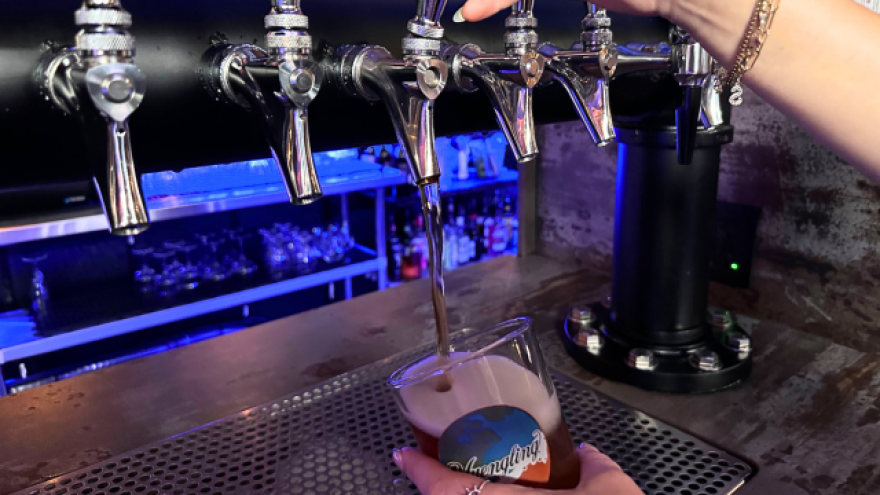BETHLEHEM, Pa. — Anyone tired of missing out on happy hour is less than a month from merriment again.
Come September, Pennsylvania House Bill 829 and Senate Bill 688 go into effect, letting qualifying retail liquor licensees extend happy hour by 10 hours.
Gov. Josh Shapiro signed the bills into law as Acts 57 and 86 of 2024, expanding on the state's complex liquor laws. Act 57, which increases happy hour, would be effective Sept. 13.
Currently, retail liquor licensees can hold happy hour — legally defined as "the period of time during which a license discounts alcoholic beverages," according to the Pennsylvania Liquor Control Board, or PLCB — for up to four hours a day and a maximum of 14 hours per week.
"A lot of times, patrons can't always make a happy hour, where they'd love to be there and take advantage of a discount."Chuck Moran, Executive Director of the Pennsylvania Licensed Beverage and Tavern Association
The liquor code last updated happy hour regulations in 2011, PLCB Press Secretary Shawn Kelly said. That created the 14-hour maximum per week.
"Before 2011, happy hour was limited to two hours per day," Kelly said. "And that goes back to Dec. 27, 1985."
Act 86 also would let restaurants, hotels, supermarkets, convenience stores and beer distributors sell ready-to-drink cocktails, or RTDC, to-go.
Retailers can sell RTDC to-go up to 192 fluid ounces per transaction. Previously, retailers such as restaurants could sell only up to 192 fluid ounces of beer to-go.
That act would go into effect Sept. 16.
'A little bit of a break'
On the surface, it appears to be a win for consumers looking to save a few dollars.
"We're definitely getting a lot of positive feedback, not only from bar owners, but also from patrons," Pennsylvania Licensed Beverage and Tavern Association Executive Director Chuck Moran told LehighValleyNews.com in July before the bills passed.
Moran said the association strongly supported the bills.
"A lot of times, patrons can't always make a happy hour, where they'd love to be there and take advantage of a discount."Pennsylvania Licensed Beverage and Tavern Association Executive Director Chuck Moran
"A lot of times, patrons can't always make a happy hour, where they'd love to be there and take advantage of a discount," Moran previously said.
"Now, should that bar decide to get a little creative and maybe offer an extra happy hour in the evening or at night, or whatever — once the bill is signed, actually they can do that."
Moran said he views Act 57 as a "win-win" for business owners and patrons, potentially creating larger influxes of customers and "a little bit of a break" to their wallets.
A difficult decision
Local business owners say it isn't always that cut and dry.
In Bethlehem, Apollo Grill only offers discounted drinks two days a week — a one-hour happy hour each Thursday and brunch features from 11 a.m. to 2 p.m. Saturdays.
"I honestly don't think I will be adding any more extra hours," owner Rachel Griffith said.
It comes down to three reasons: the changing business landscape post-coronavirus pandemic, labor costs and product costs.
Griffith said late-night crowds at traditional restaurants haven't been the same since COVID-19.
At Tally-Ho Tavern in Bethlehem, it's a different setting, where General Manager Jamey Hodgin said people of all ages come later in the evening, mostly for its dance floor and karaoke nights.
Tally-Ho's happy hour typically runs from 10 p.m. till midnight, but whether those hours will be extended is a conversation soon to be had, Hodgin said.
For now, it plans to run its "normal" discounted hours.
'Feel a bit of a pinch'
What makes that conversation difficult for business owners lies in cost, Griffith said.
"My labor costs have gone up 30 percent, my food costs have gone up 25 percent, the cost of liquor itself went up across the board, 10 percent I believe, last year or two years ago," Griffith said.
"So as much as I would love to pass along more deals to the consumer, it's very difficult for me to make that decision based on the fact that all of my costs have gone up."Rachel Griffith, owner of Apollo Grill
"So everything, all prices are being driven up. So as much as I would love to pass along more deals to the consumer, it's very difficult for me to make that decision based on the fact that all of my costs have gone up."
Griffith said she would prefer to offer consistently priced quality food and take care of her employees simultaneously.
With a staff of 50, "and every single person is paid well," Griffith said, she hopes consumers would sympathize with her desire to continue to pay her employees satisfactory wages.
Continuously decreased prices also could result in a lower income from tipped staff, which can also contribute to retention rates when its "very difficult" to find and keep employees in the service industry, she said.
"Obviously there's an unwritten rule that you should tip on the original price of something," Griffith said. "Now, we obviously know that doesn't really happen all the time.
"The staff might feel a bit of a pinch if we are constantly discounting prices and people aren't paying the normal price."
'A deal every now and then'
Still, Moran and Griffith have a common ground: The move appears to be a potential step forward from what Moran called "outdated liquor codes."
Pennsylvania is among only 17 states to have a liquor control board and often is referred to as having an unusual liquor code.
One example is its "Pizza Hut" rule, which prohibits alcohol in the presence of minors unless an adult 25-years-old or above is present.
"I think at the at the end of the day, we want to make sure whatever we're doing is well received by both the consumer and again, and for the business."Christine Piper of Piper's Pub
Christine Piper, owner of Porters' Pub in Easton, shared similar concerns regarding the legality of the change in happy hour. She and her husband, Ryan Piper, bought the pub within the past year.
"When we first took over, we had to take a class, and they were telling us exactly like, 'You can't go over this amount of time,'" Christine Piper said.
"Which is partially the reason we didn't add happy hours — because you were nervous about going over or making a mistake. So I do think that this is definitely going to be helpful."
The pub currently offers a "mug club" discount, instead of a typical happy hour. Piper said it offered less risk while still giving customers a special.
Extended happy hour provides some relief for legal concerns, so Porters' Pub could end up offering a happy hour, but it's still up in the air, she said.
Instead, the couple are most excited about the combo deals that they could offer, she said.
The passage of the two bills also allows businesses to offer up to two combination food and drink specials each day.
"I also think in these economic times, people need a deal every now and then," Piper said.
"I think at the at the end of the day, we want to make sure whatever we're doing is well received by both the consumer and again, and for the business."


